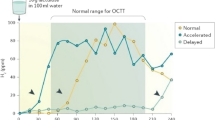Abstract
Background
Small intestinal bacterial overgrowth (SIBO) may cause symptoms in patients with abdominal bloating, distension, and gas. SIBO can be assessed using the lactulose breath test (LBT). A commonly used probiotic supplement is Align containing Bifidobacterium infantis 35624. The aim of this study was to determine the effect of B. infantis 35624 on hydrogen and methane excretion during LBT.
Methods
Healthy subjects underwent LBT before and after 2 weeks of daily Align administration. Hydrogen and methane concentrations were measured for each breath sample. Results are expressed as mean ± SE and analyzed using repeated measures ANCOVA. A breath test was considered positive if hydrogen and/or methane increased > 20 ppm above baseline by 90 min of the test or if a dual hydrogen peak was present.
Results
Nineteen healthy subjects were studied. Hydrogen levels were similar pre- and post-probiotic across the 3-h study (p = 0.768). In contrast, methane levels were significantly higher with probiotic administration (p = 0.012). A rise in methane > 20 ppm was seen in three subjects pre-probiotic but six post-probiotic. Of the 19 subjects, an “abnormal” LBT pre-probiotic was present in ten subjects and during the probiotic, 13 were abnormal.
Conclusions
This study found that 2 weeks of B. infantis 35624 (Align) supplementation affects LBT assessment for SIBO by significantly increasing methane, but not hydrogen, excretion after lactulose administration. Methane levels reached values that would be considered positive for SIBO patients. This study suggests that patients undergoing LBT should discontinue probiotics prior to the test as these supplements may alter the test results.


Similar content being viewed by others
References
Di Cerbo A, Palmieri B, Aponte M, Morales-Medina JC, Iannitti T. Mechanisms and therapeutic effectiveness of lactobacilli. J Clin Pathol. 2016;69:187–203.
Boltin D, Perets TT, Shporn E, et al. Rifaximin for small intestinal bacterial overgrowth in patients without irritable bowel syndrome. Ann Clin Microbiol Antimicrob. 2014;13:49.
George NS, Sankineni A, Parkman HP. Small intestinal bacterial overgrowth in gastroparesis. Dig Dis Sci. 2014;59:645–652.
Saad RJ, Chey WD. Breath testing for small intestinal bacterial overgrowth: maximizing test accuracy. Clin Gastroenterol Hepatol. 2014;12:1964–1972. (quiz e1119–1920).
Whorwell PJ. Do probiotics improve symptoms in patients with irritable bowel syndrome? Ther Adv Gastroenterol. 2009;2:37–44.
Charbonneau D, Gibb RD, Quigley EM. Fecal excretion of Bifidobacterium infantis 35624 and changes in fecal microbiota after eight weeks of oral supplementation with encapsulated probiotic. Gut Microbes. 2013;4:201–211.
van Baarlen P, Troost F, van der Meer C, et al. Human mucosal in vivo transcriptome responses to three lactobacilli indicate how probiotics may modulate human cellular pathways. Proc Natl Acad Sci USA. 2011;108:4562–4569.
O’Toole PW, Cooney JC. Probiotic bacteria influence the composition and function of the intestinal microbiota. Interdiscip. Perspect Infect Dis. 2008;2008:175285.
Rentz AM, Kahrilas P, Stanghellini V, et al. Development and psychometric evaluation of the patient assessment of upper gastrointestinal symptom severity index (PAGI-SYM) in patients with upper gastrointestinal disorders. Qual Life Res. 2004;13:1737–1749.
Islam SU. Clinical uses of probiotics. Medicine. 2016;95:e2658.
Floch MH. Use of diet and probiotic therapy in the irritable bowel syndrome: analysis of the literature. J Clin Gastroenterol. 2005;39:S243–S246.
Pimentel M, Mathur R, Chang C. Gas and the microbiome. Curr Gastroenterol Rep. 2013;15:356.
Rezaie A, Pimentel M, Rao SS. How to Test and Treat Small Intestinal Bacterial Overgrowth: an Evidence-Based Approach. Curr Gastroenterol Rep. 2016;18:8.
McFarland LV. Evidence-based review of probiotics for antibiotic-associated diarrhea and Clostridium difficile infections. Anaerobe. 2009;15:274–280.
Author information
Authors and Affiliations
Contributions
Krishma Kumar, BS was involved in study concept and design, data entry, analysis and interpretation of data, statistical analysis, and drafting of manuscript. Mohammed Saadi, MD was involved in study set-up and review of manuscript. Frederick V. Ramsey, PhD was involved in analysis of data and review of manuscript. Ron Schey, MD was involved in study concept and design, interpretation of data, review of manuscript. Henry P. Parkman, MD was involved in study concept and design, analysis and interpretation of data, critical revision of the manuscript for important intellectual content, and study supervision.
Corresponding author
Ethics declarations
Conflict of interest
The authors declare that they have no competing interests.
Rights and permissions
About this article
Cite this article
Kumar, K., Saadi, M., Ramsey, F.V. et al. Effect of Bifidobacterium infantis 35624 (Align) on the Lactulose Breath Test for Small Intestinal Bacterial Overgrowth. Dig Dis Sci 63, 989–995 (2018). https://doi.org/10.1007/s10620-018-4945-3
Received:
Accepted:
Published:
Issue Date:
DOI: https://doi.org/10.1007/s10620-018-4945-3




